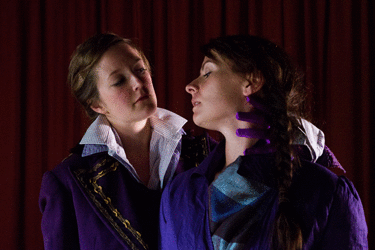L'Incoronazione di Poppea (Snape Proms)

© Sam Murray-Sutton
There's nothing like throwing young singers in at the deep end with a staging by Daisy Evans which keeps the characters in the audience's eye right from the beginning. There are entrances through the seating and promenade area and some clever use of projections (Ziggy Jacobs is the designer) which involve the singers in their manipulation.
The twelve instrumentalists are grouped with Egarr stage left; four theorbos make a wonderful, if occasionally distracting, sight. The sound balance is excellent with most of the cast projecting melody and decoration with equal ease. We are spared a drag Arnalta with Camille Merckx in the role, though John Lattimore has a well-judged hint of camp as Ottavia's nurse.
Alice Rose Privett is a fine Nerone, a vicious boy on the cusp of adulthood who already savours the artistry inherent in gratuitous violence. The exchange with Geoffroy Buffière's sonorous Seneca stands out, as do the love scenes with Rannveig Káradóttir's vocally and visually sinuous Poppea. You can see why Wanda Franek's mischievous Amore favours them.
Fortuna is a fickle goddess; Katherine Crompton's full round tones have the right steel underbite. There's steel also in Abigail Lewis' fraught Ottavia, trailing her tail of a white crinoline as she loses her husband and invites his vengeance as well as that of the affronted gods. The naïvely doting Drusilla puts heartbreak into every phrase as she trills her joy when she thinks Ottone has finally returned her love.
Of course, he hasn't. Douglas Dodson displays a strong counter-tenor with baritone foundations. Seneca's enforced suicide has a male voice trio to protest it. Whoever actually wrote it, the final "Pur ti miro" duet sprinkles its usual stardust as Poppea processes with the husband she has finally captured. But not tamed. Her white peacock tail is already as transient as her chance of happiness.










